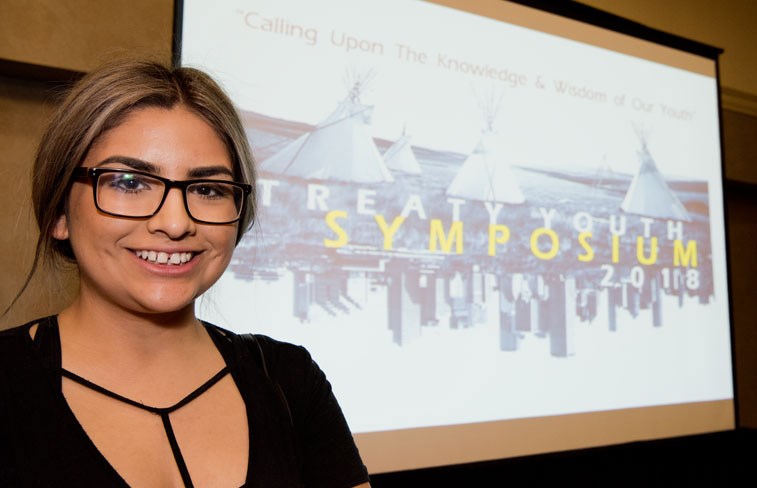Dylan Lightning had an adopted sister once.
The 25-year-old from Ermineskin First Nation said his family adopted her out of foster care and raised her for six years.
“She was a smart person,” he said, and they raised her in a home that was drug-and-alcohol free and in touch with its Indigenous roots.
Lightning said his sister moved out when she was 18 to go to school in Edmonton, but kept in touch. Within a year, he learned that she had taken her own life.
There were no signs of trouble, Lightning said. To this day, he still doesn’t know why she did it.
“The only thing I know for sure is she wasn’t with her (birth) family.”
Lightning was one of about 65 Indigenous youths who were in Edmonton last week for a conference on Alberta’s child welfare system. Many had either been through or knew someone who had been through foster care.
The conference was the first in 40 years to draw youth from every Treaty 6, 7, and 8 First Nation together to talk on an issue, said co-organizer Kiana Cardinal-Arcand, an Alexander resident. It’s also the first to ask youth with experience with the foster care system on how to reform that system.
“If you ask a First Nations person if they’ve been in (foster) care or know someone who was in care, 100 per cent will say yes,” said Cardinal-Arcand.
She personally had a childhood friend who grew up in foster care who fell in with a gang and died.
“She could have had a better life.”
Lost youth
Indigenous youth represent about 10 per cent of Alberta’s youth but make up about 69 per cent of the kids in the child welfare system, wrote Del Graff, the Alberta child and youth advocate and speaker at the conference, in his 2016 report on Indigenous youths in care.“Aboriginal children come into care more often, stay in care longer, and are less likely to be returned to their families than their non-Aboriginal peers,” Graff wrote.
“Things are clearly not working.”
Centuries of colonialism have turned Indigenous youths into “cultural blanks” bereft of direction and identity, renowned Indigenous educator Leroy Little Bear said at the conference. Without that cultural knowledge, these youths are prone to give up on society and fall into gangs, addictions, and poor mental health.
Lightning said many of the foster care youths he works with around Maskwacis aren’t in touch with their culture and fall into alcohol, addictions, and suicide.
“Anytime somebody goes into the system, they’re lost. They’re not with their families, they’re not with their siblings, they’re not with their grandparents.”
Many foster kids end up with non-Indigenous families and don’t learn their traditional languages and culture, said conference attendee Robin Hunter of Saddle Lake. (Just 29 per cent of Indigenous foster kids in Alberta have at least one Indigenous foster parent, Statistics Canada reports.) Once they leave care, they struggle to reconnect with their home communities.
“It’s very much like the residential school system,” she said.
Underfunding was another influence on foster kids, Cardinal-Arcand said.
“Our housing straight up sucks,” she said, and that undercuts a person’s self-worth.
“How can you tell a youth that their life matters (when) they go home to a literally falling apart home?”
Cardinal-Arcand and Lightning said cultural knowledge could help youths turn away from trouble. Feasts, sweats, and ceremonies keep you grounded, and teach values such as the importance of family and life.
Cardinal-Arcand said she and her co-organizers would summarize the recommendations coming out of this conference and present them to Treaty 6, 7, and 8 leaders. She hoped to organize a second youth conference next year.



